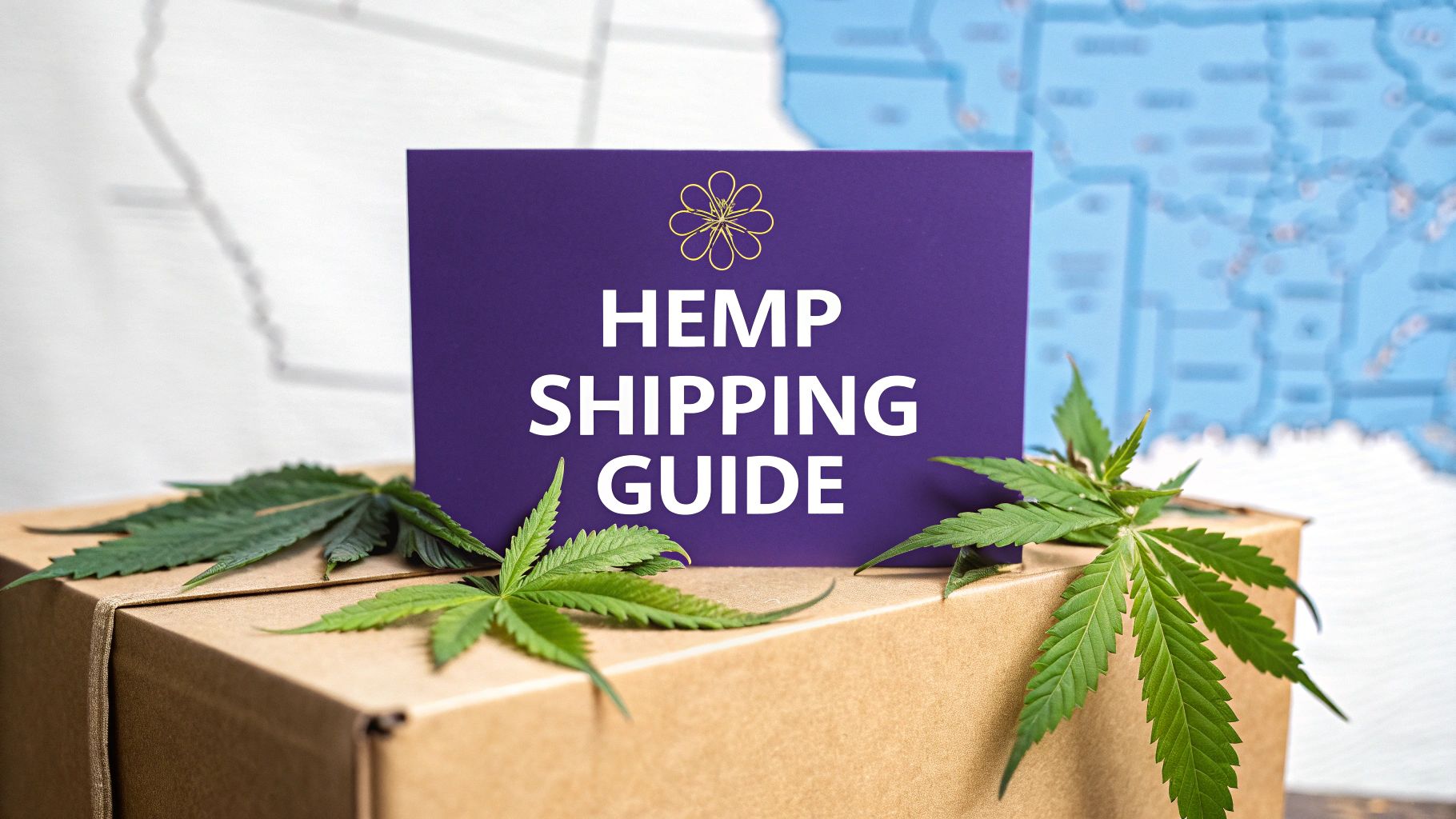
CBD/Hemp/THCA Shipping Laws Georgia: Complete Guide
Learn everything about CBD/Hemp/THCA Shipping Laws Georgia. Our expert guide covers compliance, licensing, and carrier rules for legal shipping.
Cody Y.
Updated on Oct 16, 2025
So, can you legally ship CBD, hemp, and THCA products to customers in Georgia? The short answer is yes, but it’s a minefield of compliance rules you absolutely cannot afford to ignore. While federal law opened the doors for hemp commerce, Georgia's own specific regulations dictate exactly what you can—and can't—get away with.
Decoding Georgia's Hemp Shipping Landscape
Trying to understand the rules for shipping CBD, hemp, and THCA in Georgia can feel like solving a puzzle with half the pieces missing. The 2018 Farm Bill was a game-changer, federally legalizing hemp by drawing a clear line between it and marijuana. But here's the catch: it also gave states the power to create their own rulebooks. Georgia took that power and ran with it.
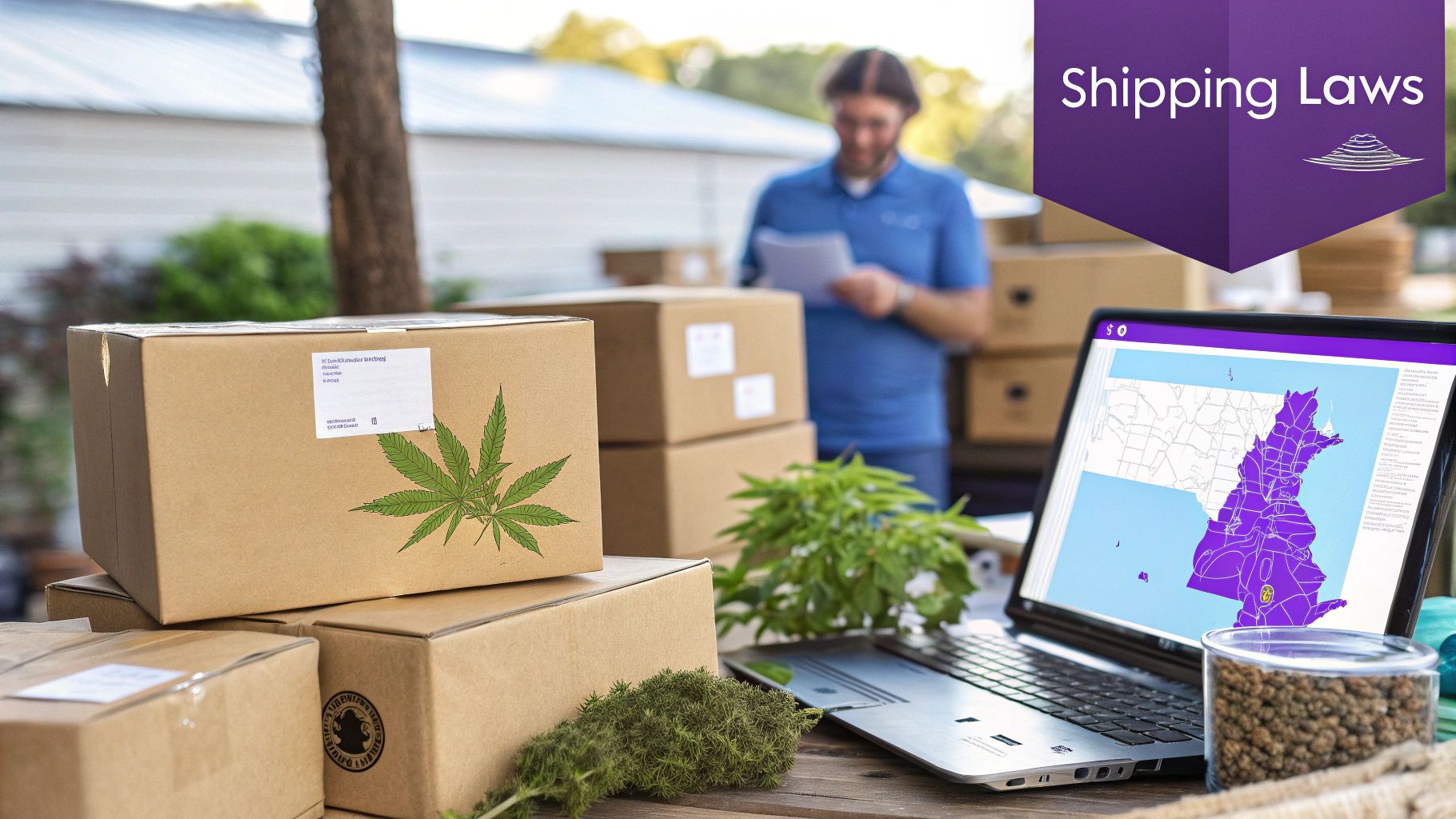
Think of the Farm Bill as the main interstate highway. It’s open for business. Georgia’s laws, though, are the local roads, speed limits, and toll booths you have to navigate to reach your destination. Just because the highway is clear doesn’t mean you can blow through a stop sign in a small town. The same logic applies here.
Before we dive deeper, here's a quick look at the legality of shipping various hemp products to Georgia.
Georgia Hemp Product Shipping Legality At-a-Glance
This table provides a snapshot of what's generally allowed when shipping hemp-derived products to Georgia. Remember, the details matter, so treat this as a starting point.
| Product Type | Delta-9 THC Content | Shipping Status in Georgia | Key Restriction |
|---|---|---|---|
| CBD Oil/Tinctures | Below 0.3% | Legal | Must have a COA verifying THC content. |
| Hemp Edibles | Below 0.3% | Legal | Subject to strict potency and labeling rules. |
| Smokable Hemp Flower | Below 0.3% | Highly Restricted | Retail sale and shipping are effectively banned. |
| THCA Flower | Below 0.3% (pre-decarb) | Gray Area / Risky | Total THC rules post-decarboxylation are critical. |
| Delta-8 Products | Below 0.3% Delta-9 THC | Legal (for now) | Legal status is frequently challenged. |
As you can see, it's not a simple "yes" or "no." The legality shifts based on the product type and its chemical makeup.
Key Factors Shaping Compliance
Successfully shipping these products comes down to getting a few core things right. You have to prove your products meet Georgia’s legal definitions, have the right paperwork on hand, and play by the carrier’s rules. Mess up any one of these, and you’re looking at seized packages, lost revenue, or worse, legal headaches.
Here’s what you absolutely need to master:
- Delta-9 THC Concentration: This is the big one. Every single product must contain less than 0.3% Delta-9 THC on a dry weight basis. This is a non-negotiable federal and state line in the sand.
- Product Type and Potency: Georgia doesn’t treat all hemp products the same. For instance, smokable hemp flower is a no-go for retail sale and shipping, while edibles face tight limits on how much THC they can contain.
- Mandatory Documentation: Every shipment needs a Certificate of Analysis (COA) from a third-party lab tucked inside. This is your proof that the product is legal. If a package gets inspected, the COA is your first and best line of defense.
- Carrier Policies: Don’t forget that USPS, UPS, and FedEx have their own distinct rules for shipping hemp products. Following their guidelines is just as critical as following state law.
The biggest hurdle for most e-commerce brands is the gap between what's federally legal and what Georgia specifically allows. Compliance isn't just about hitting that 0.3% THC target; it’s about mastering the fine print in Georgia's rulebook.
If you’re trying to see how Georgia’s laws stack up against the rest of the country, checking out a complete state-by-state CBD shipping compliance guide can give you the bigger picture. In the end, taking the time to understand these nuances is the only way to run a successful and bulletproof shipping operation in the Peach State.
How Georgia's Hemp Laws Evolved
To really get a handle on today’s shipping rules for CBD, hemp, and THCA in Georgia, you have to look at how we got here. The legal landscape wasn't built in a day. It’s a story of a massive federal breakthrough, state-level scrambling to keep up, and a constant tug-of-war between a booming industry and the need for guardrails. The whole journey starts with one federal law that changed everything.
The big domino to fall was the 2018 Farm Bill. This landmark federal act officially took hemp off the controlled substances list. It defined legal hemp as any cannabis plant containing less than 0.3% Delta-9 THC by dry weight, basically giving the entire country a green light. This one move opened the floodgates, but it also tossed the hot potato to individual states to build their own regulatory frameworks.
Georgia's Response: The Hemp Farming Act
Right on the heels of the feds, Georgia lawmakers passed the Georgia Hemp Farming Act in 2019. This state law adopted the federal definition of hemp, laying the legal foundation for farmers, processors, and retailers to operate. But it was more than just a copy-paste job; the act created a state-run program to license and regulate hemp cultivation and processing. Just like that, Georgia’s green rush was on.
The economic impact was immediate. The new legal clarity sparked a gold rush, with a surge of businesses eager to jump into the exploding market for CBD and other hemp products.
This wasn't just about creating new products on shelves; it created an entirely new agricultural sector for the state. You could feel the excitement—many saw hemp as the next big cash crop for Georgia farmers.
But as you might guess, this explosive growth quickly led to some unintended consequences and regulatory headaches, forcing lawmakers to go back to the drawing board.
The Rise of Intoxicating Cannabinoids and New Rules
As the market got more sophisticated, producers figured out how to isolate and sell other cannabinoids from the hemp plant. Suddenly, compounds like Delta-8 THC, Delta-10 THC, and THCA were everywhere. While they were technically derived from legal hemp, these products could get you high, creating a massive legal gray area nobody saw coming.
This new wave of intoxicating-but-legal products raised public safety flags and triggered a swift response from legislators. The industry was growing so fast it was clear that tighter controls were needed to protect consumers and rein in a market that was becoming the Wild West. Georgia's hemp industry had blossomed, with the state issuing over 1,200 hemp licenses and creating an estimated 10,000 jobs across roughly 15,000 acres. This expansion, however, just shined a brighter light on the need for updated rules, especially for these new intoxicating products. You can get more details on the legislative changes shaping Georgia's hemp industry.
The state's answer was Senate Bill 494. Signed into law, this new legislation got much stricter, adding:
- Age Restrictions: You now have to be at least 21 to buy hemp products.
- Potency Caps: Clear limits were set on how much THC can be in edibles and other consumables.
- Labeling Requirements: Brands now have to use clear, accurate labeling to stop misleading marketing.
This cycle of innovation, explosive growth, and regulatory catch-up is what has shaped the complex CBD/Hemp/THCA shipping laws Georgia businesses deal with today. Understanding this history—from the initial legalization to the reactive tightening of the rules—is the key to shipping your products compliantly and confidently in the Peach State.
Getting the Language Right: CBD, Hemp, and THCA
One of the biggest hurdles in navigating Georgia's shipping laws for hemp-derived products is just getting the language straight. People often toss around terms like "hemp," "CBD," and "THCA" as if they mean the same thing. From a legal and compliance standpoint, they absolutely do not.
Mixing them up is the fastest way to turn a perfectly legal shipment into an illegal one.
Let’s start with the bedrock of this entire industry: hemp. For all practical purposes, think of hemp as the non-intoxicating cousin in the cannabis family. The single most important detail is its Delta-9 THC content. Under both federal and Georgia law, a cannabis plant is only considered legal hemp if it contains less than 0.3% Delta-9 THC on a dry weight basis. Anything over that magic number is legally marijuana, and that's a whole different ballgame.
From this legal hemp plant, we get all sorts of compounds, but two, in particular, cause the most confusion.
The Difference Between CBD and THCA
CBD (Cannabidiol) is the straightforward one. It's a non-intoxicating compound that has exploded in popularity for wellness. As long as it comes from legal hemp and the final product stays under that 0.3% Delta-9 THC threshold, CBD is legal to produce, sell, and ship in Georgia. No real gray area here.
But then there's THCA (Tetrahydrocannabinolic acid). This is where things get complicated, fast.
THCA is the raw, non-psychoactive precursor to THC. I like to use a baking analogy: think of THCA as raw cake batter. In its natural state, you can eat it, but it's just goop—it's not cake, and it won't get you high. But once you apply heat by smoking, vaping, or cooking it, a chemical process called decarboxylation kicks in. Suddenly, that inert batter transforms into a fully baked, intoxicating cake (THC).
This infographic breaks down how these compounds relate.
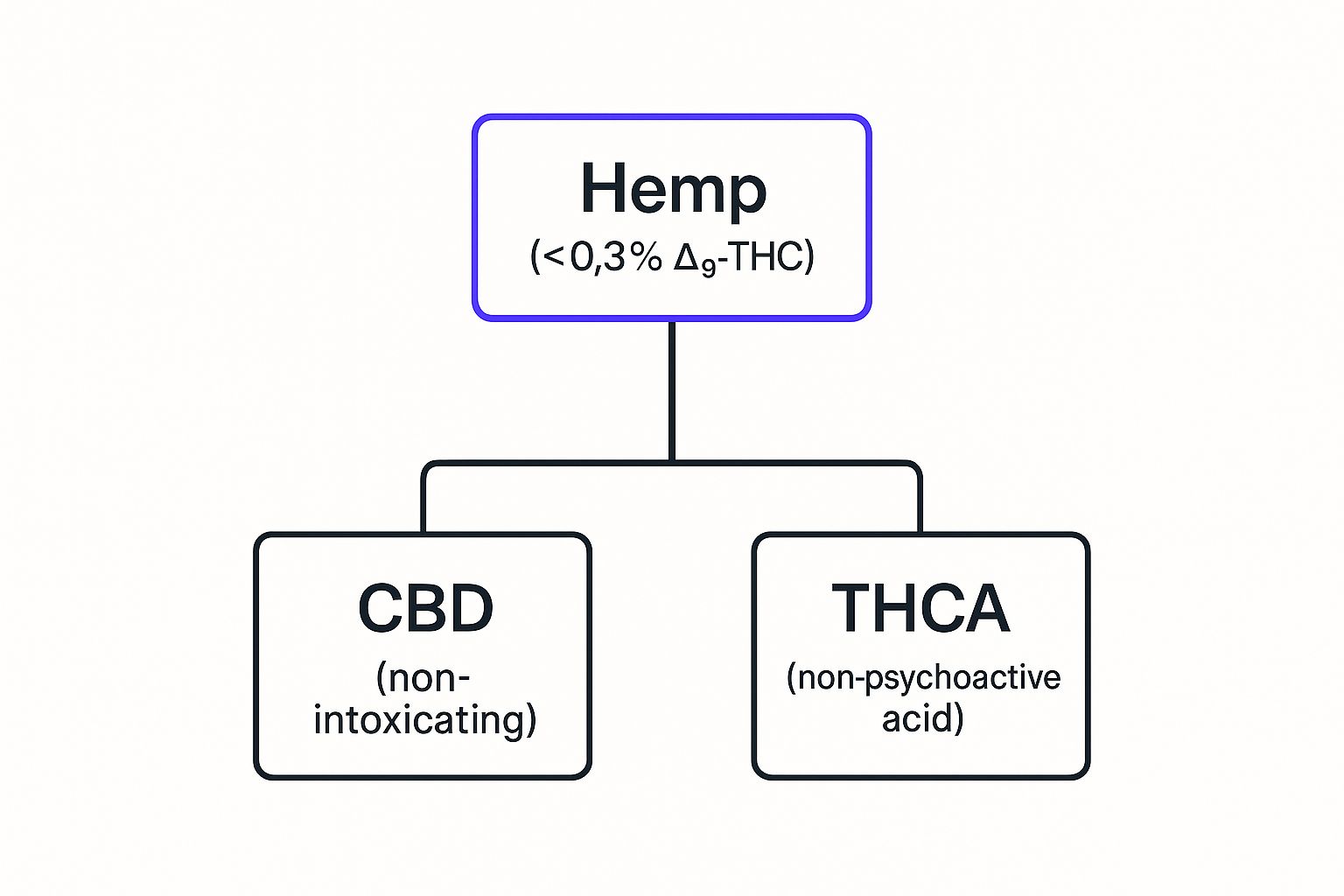
As you can see, both CBD and THCA can come from the exact same legal hemp plant. The crucial difference lies in their chemical properties and, more importantly, how the law interprets them.
THCA's Precarious Legal Gray Area
So, what makes THCA so legally tricky? It all boils down to a single question: when is the THC content measured?
Many sellers of THCA products, like raw flower, point to lab results showing the product is under the 0.3% Delta-9 THC limit before it's heated. Based on that snapshot in time, they argue it's a legal hemp product. However, regulators and law enforcement are increasingly adopting a "total THC" perspective. This approach calculates the potential Delta-9 THC that could be created after heating.
This "total THC" concept is the heart of the entire legal debate. A THCA flower testing at 20% THCA and 0.2% Delta-9 THC is technically legal hemp sitting on a shelf. The moment a customer lights it up, it becomes a potent marijuana product. It's this potential for conversion that shoves THCA products into a dangerous legal gray zone.
Because of this, shipping THCA into Georgia carries a much higher risk than shipping CBD. A package of high-THCA flower looks and smells just like illegal marijuana to a drug-sniffing dog or a police officer. Your pre-combustion lab reports won't matter much at that point. Understanding these critical shipping law differences between hemp and marijuana products is non-negotiable for anyone in this business.
Nailing these definitions is the first and most important step to staying compliant. While hemp and CBD have a fairly clear path in Georgia, THCA exists in a murky territory that requires extreme caution from anyone looking to ship it.
Meeting Georgia's Specific Shipping Requirements
Getting a handle on Georgia's shipping laws for CBD, hemp, and THCA products is more than just knowing the basics. It takes a practical, almost obsessive approach to compliance. Think of it like building a piece of furniture—if you skip one screw, the whole thing might look fine at first, but it's fundamentally unstable. One small compliance miss can jeopardize your entire shipment.
The absolute bedrock rule, the one you can't ever forget, is the 0.3% Delta-9 THC limit. Every single product you ship has to meet this federal and state standard. No exceptions. But Georgia doesn't stop there. The state has rolled out a whole set of specific rules for different product types that can easily trip up even the most careful e-commerce brands.
Potency Caps and Product-Specific Bans
Georgia has drawn some very clear lines in the sand about what kind of hemp products can be sold and shipped. One of the biggest roadblocks is the complete ban on selling or shipping smokable hemp flower and leaves directly to consumers. So, while the plant might be legal to grow in the state, getting it to a retail customer's doorstep is a definite no-go.
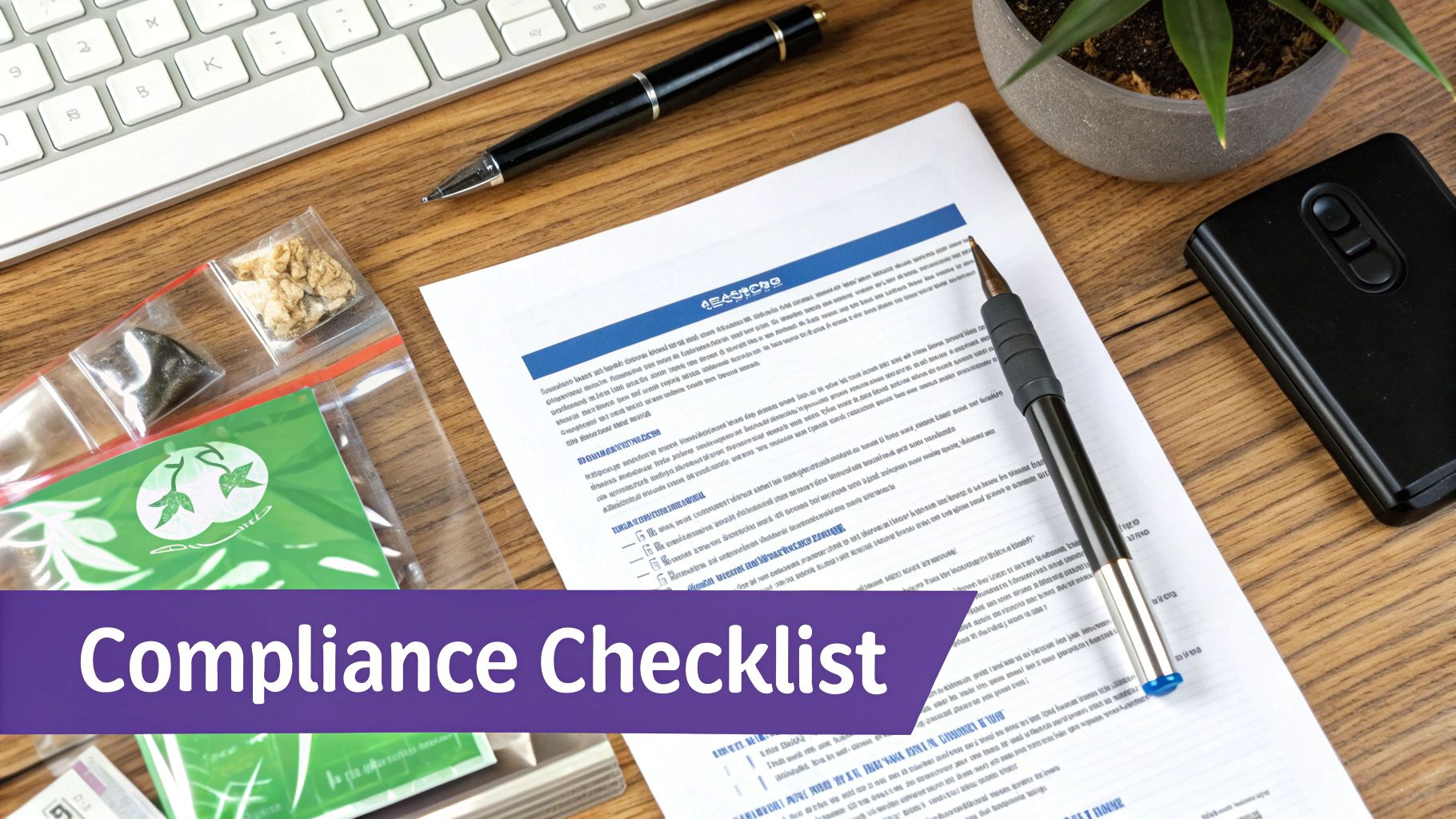
On top of that, the state has put strict potency caps on edibles and other consumables. Georgia's Hemp Farming Act of 2019 laid the groundwork, but later changes like SB 494 tightened the screws significantly, defining exact limits for legal hemp products. It's worth reading up on how Georgia's CBD regulations have evolved to get the full picture of the current legal landscape.
Here's a detailed look at the current restrictions you absolutely must follow.
Georgia Hemp Product Potency and Type Restrictions
This table breaks down the legal limits for various hemp-derived products sold and shipped in Georgia. These aren't just guidelines; they are hard-and-fast rules enforced by the state. A product that’s perfectly legal in another state could be considered contraband if it crosses these thresholds in Georgia.
| Product Category | Maximum Delta-9 THC per Serving | Maximum Delta-9 THC per Package | Additional Restrictions |
|---|---|---|---|
| Gummies & Edibles | 10 mg | 150 mg | Must be intended for ingestion. |
| Topicals | Not Applicable | 1,000 mg | Creams, lotions, and balms. |
| CBD Oils (Dropper) | Not Applicable | 1 mg | Per entire container. |
| Smokable Hemp | Not Applicable | Not Applicable | Sale and shipment to consumers is prohibited. |
Carefully review this table against your product catalog. Sticking to these limits is non-negotiable for anyone shipping into the Peach State.
Your Essential Pre-Shipment Checklist
To make sure every package you send is bulletproof, you need a solid pre-shipment process. This isn't just about tossing a product in a box—it's about building a fortress of documentation and transparency around it. A well-prepared shipment is the difference between a happy customer and a costly seizure.
The goal is to make your package undeniably compliant. If a carrier or a cop opens it, the contents should scream "legal" so loud and clear that there's zero room for misinterpretation.
Use this checklist for every single order you ship to Georgia:
-
Verify the Certificate of Analysis (COA): First thing's first. Grab the COA from an accredited third-party lab and confirm the Delta-9 THC is below 0.3% on a dry-weight basis. For THCA products, pay close attention to the "total THC" number, as that's what regulators are increasingly looking at to gauge the product's potential psychoactivity after decarboxylation.
-
Include Documentation in Every Shipment: Put a physical copy of that COA inside every single box. This is your primary evidence. Some savvy shippers also stick a notice to law enforcement on the outside of the package, clearly stating that the contents are legal hemp.
-
Scrutinize Product Labeling: Your labels have to be precise and can't make any wild health claims. They need to clearly state the total cannabinoid content and include a QR code that links directly to the product’s COA. Also, make sure your branding and packaging don't look like they're designed to appeal to kids.
-
Implement Strict Age Verification: Georgia law is clear: buyers of hemp products must be 21 or older. Your e-commerce store absolutely must have a reliable age verification system at checkout. Skipping this step is a massive compliance failure.
By working through these steps systematically, you build an operational framework that protects your business. Meeting Georgia’s shipping requirements all comes down to precision and documentation—making sure every package is not just legal, but provably legal.
Choosing the Right Shipping Carrier
Just because your CBD, hemp, or THCA product is fully compliant with Georgia's laws doesn't automatically mean every shipping carrier will welcome it with open arms. Getting your products right with CBD/Hemp/THCA shipping laws Georgia has in place is really only half the battle. The other half is wading through the individual policies of major carriers, which often feel like a completely separate set of rules you have to follow.
Think of it this way: Georgia law is the government-issued driver's license that says you're legally allowed to drive. The carrier's policy is the rental car company's terms of service—they might have their own extra rules, like age limits or restrictions on where you can take the car. You have to satisfy both to get where you're going. Each carrier—USPS, UPS, and FedEx—has its own unique take on shipping hemp-derived products, and understanding these differences is crucial for protecting your business.
Comparing the Major Carriers
Not all shipping carriers see eye-to-eye when it comes to hemp. Their policies can range from cautiously accepting to downright hostile, and picking the wrong one can lead to seized packages, suspended accounts, and a major hit to your bottom line. Let's break down the current landscape.
- USPS (United States Postal Service): As a federal agency, USPS is usually the safest bet for shipping hemp. Their policies are built to align directly with federal law, specifically the 2018 Farm Bill. This makes them a far more predictable and reliable option for businesses shipping legal hemp products.
- UPS (United Parcel Service): UPS does allow you to ship hemp and CBD products, but their terms are noticeably stricter. They demand that you comply with all federal, state, and local laws, and they make it clear they can inspect your packages and reject any shipment they decide is non-compliant.
- FedEx: Out of the big three, FedEx is easily the most restrictive. They generally prohibit shipping hemp plants, leaves, and oil, with very few exceptions. Trying to ship through FedEx without getting explicit, written approval beforehand is a high-risk gamble you probably don't want to take.
For the vast majority of e-commerce businesses in this space, USPS is the clear front-runner. Its status as a federal entity provides a layer of legal clarity that private carriers just can't offer.
Preparing Your Shipments for USPS
Even if you go with the preferred carrier, you can't just toss your products in a box and call it a day. To stay on the right side of USPS regulations, you have to prepare each shipment with extreme care. This goes way beyond just good packaging; it requires building a fortress of documentation around every order.
The core idea is simple: your package must be so obviously and transparently legal that any inspection immediately ends in your favor. You need to leave absolutely no room for doubt.
To make every shipment bulletproof, follow these steps:
- Include All Necessary Documentation: Every single package has to contain a physical copy of the third-party Certificate of Analysis (COA). This document is your most important piece of evidence proving the product's Delta-9 THC concentration is below the 0.3% legal limit.
- Retain Producer Licensing: You must have a copy of your (or your supplier's) hemp producer license on file. While you don't need to stick it in every box, you have to be ready to produce it immediately if USPS ever asks for it.
- Use Discreet Packaging: Avoid putting any branding, logos, or text on the outside of your package that screams CBD, hemp, or THCA. Plain, discreet packaging dramatically reduces the chances of theft or unnecessary scrutiny.
Going beyond these basics, taking the time to understand broader hemp shipping rules and restrictions can add extra layers of protection for your business.
Finally, always consider getting shipping insurance. Despite your best efforts, packages can get lost, damaged, or even wrongfully seized. Insurance acts as a critical financial safety net, protecting your revenue and making sure you can reship orders to keep your customers happy. By carefully selecting your carrier and preparing each package with precision, you can successfully navigate the final logistical hurdles of selling hemp products in Georgia.
Common Shipping Mistakes to Avoid
Even the most buttoned-up businesses can trip over the tangle of CBD/Hemp/THCA shipping laws Georgia has on the books. A simple oversight isn't just a minor hiccup; it can quickly snowball into seized shipments, furious customers, and fines that sting. You have to approach this with a proactive mindset, treating every single package like it’s headed straight for a regulatory inspection.
Think of compliance as your pre-flight checklist. Missing one small step might seem trivial, but it has the power to ground your entire operation. Let’s walk through the most common pitfalls we see businesses fall into and, more importantly, how you can sidestep them to keep your deliveries smooth and successful.
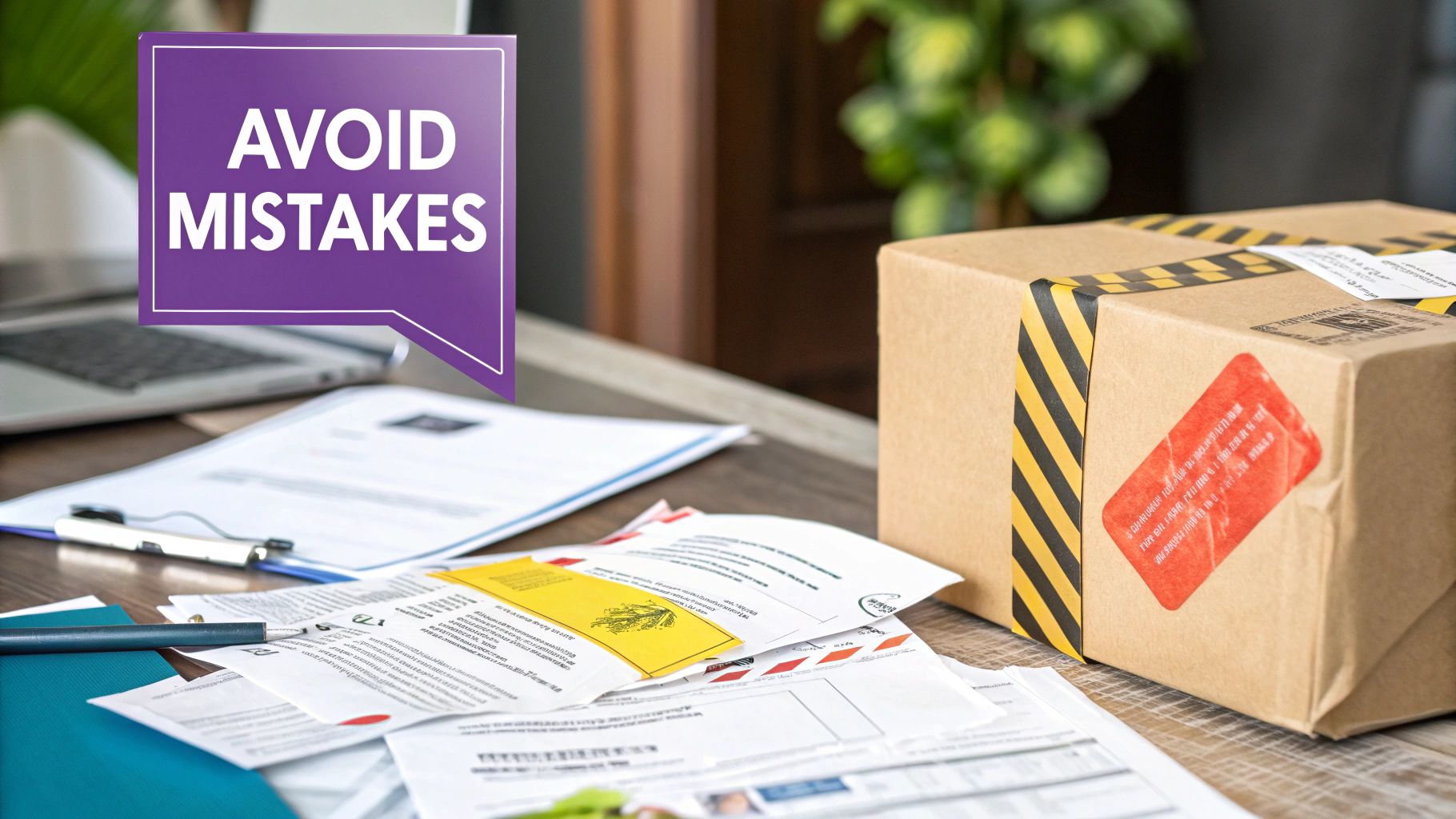
Misinterpreting Lab Reports
One of the easiest—and most dangerous—mistakes is misreading a Certificate of Analysis (COA). Many sellers glance at the Delta-9 THC percentage, see it’s safely below 0.3%, and breathe a sigh of relief. But that's not the whole story. Regulators, especially when it comes to THCA products, are looking at the bigger picture.
The number you absolutely must pay attention to is "Total THC." This figure shows the total potential Delta-9 THC once the product is heated and the THCA converts (a process called decarboxylation). A high-THCA flower might be technically legal sitting on the shelf, but if its Total THC potential is high, law enforcement can classify it as illegal marijuana.
Always review the Total THC calculation on your COAs. Shipping a product with 25% potential THC is a massive red flag, even if the Delta-9 value is technically compliant before combustion. This one detail can be the difference between a legal hemp shipment and a felony drug trafficking charge.
Overlooking Packaging and Labeling Nuances
Your packaging is more than just branding; in a regulated industry, it’s your first line of defense—or your first point of failure. Georgia has specific rules meant to keep hemp products from looking appealing to minors.
Here are some of the most common packaging blunders:
- Using cartoon characters or flashy, candy-like designs.
- Making unproven health or medical claims anywhere on the label.
- Forgetting to include a scannable QR code that links directly to the product’s COA.
These might feel like small branding choices, but in the eyes of regulators, they are major compliance violations. Your packaging has to be professional, purely informational, and clearly aimed at an adult audience.
Neglecting Robust Age Verification
Another critical slip-up is failing to implement a rock-solid age verification system for your online sales. Georgia law is crystal clear: consumers must be 21 or older to buy any hemp-derived products. A simple "I am over 21" checkbox on your website just doesn't cut it anymore.
A truly compliant checkout process needs to integrate a reliable, third-party age verification service that can check a customer's identity against public records. For any e-commerce business shipping to Georgia, this is non-negotiable. Skipping this step doesn’t just violate state law; it throws the door wide open to serious legal liability. Making these small, proactive tweaks to your shipping process is what protects your revenue, your reputation, and your customers.
Frequently Asked Questions
When it comes to the nitty-gritty of shipping hemp products to Georgia, a lot of specific questions pop up. Here are some straightforward answers to the questions we hear most often from both shoppers and e-commerce sellers.
Can I Legally Get THCA Flower Mailed to Me in Georgia?
This is a very gray area, and frankly, it’s a big risk. You might find some online stores willing to ship it, but Georgia law explicitly bans the sale of smokable hemp flower directly to consumers.
The core problem is that high-THCA flower looks, smells, and feels exactly like illegal marijuana. To law enforcement, it's the same thing until proven otherwise. Even if you have a lab report showing it’s legal before it’s lit, a police officer on the street is almost certain to treat it as contraband.
Bottom line: having smokable THCA flower shipped to your house in Georgia puts you in a legally dangerous spot. It’s much safer to assume it's prohibited.
What’s the Single Most Important Document for Shipping Hemp Products?
Without a doubt, it’s the Certificate of Analysis (COA). This lab report, from a credible third-party lab, is your golden ticket. It’s the one piece of paper that proves your product is legal hemp by verifying its Delta-9 THC level is under the 0.3% federal and state threshold.
Every single shipment should have a current and accurate COA packed inside. If a package gets flagged for inspection, this document is the first—and best—piece of evidence you have to prove its legality. Without it, you’re just shipping a box of mystery cannabis.
Are There Age Restrictions for Buying Hemp Products Online in Georgia?
Yes, absolutely. Georgia law is crystal clear: you must be 21 years of age or older to buy any hemp-derived products, whether it's CBD oil or other legal cannabinoid goods.
For online retailers, this isn't a friendly suggestion—it's a legal mandate. You need to have a reliable, third-party age verification system integrated into your checkout process. Skipping this step is asking for trouble.
Can My Package Be Seized Even If the Product Inside Is Legal?
Unfortunately, yes, it can happen. A shipment can be seized if it's missing the right paperwork, labeled improperly, or simply if a carrier or law enforcement officer suspects it contains something illegal. This is exactly why being meticulous with every package is so important.
To keep your risk as low as possible, stick to these best practices:
- Use Discreet Packaging: Don't use any branding on the outside of your box that screams "CBD" or "hemp." Keep it plain and professional.
- Include All Your Paperwork: Make sure that COA is inside the box. Many sellers also include a printed notice to law enforcement explaining the contents are federally legal hemp.
- Choose Your Carrier Wisely: The USPS is generally considered the most reliable option for shipping hemp, as they operate strictly under federal law, which clearly permits it.
Following these steps makes your shipment transparently compliant and dramatically reduces the odds of a seizure, ensuring your Georgia customers get their orders without a hitch.
Navigating state-by-state shipping rules is complex and time-consuming. Ship Restrict automates compliance by allowing you to create granular restriction rules by state, county, city, or ZIP code, ensuring you never make a costly shipping mistake again. Learn more at ShipRestrict.com

Cody Yurk
Founder and Lead Developer of ShipRestrict, helping e-commerce businesses navigate complex shipping regulations for regulated products. Ecommerce store owner turned developer.